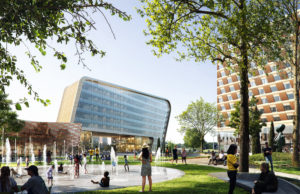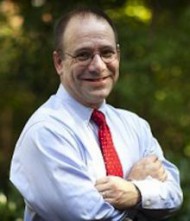
A rendering of the Detroit Center for Innovation.
A newly appointed faculty committee has started meeting at a brisk pace to create new forms of master’s degrees and certificate programs that will be available at the planned Detroit Center for Innovation.
21 faculty members and administrators were appointed to the Detroit Center for Innovation Curriculum Development Committee. The committee of 17 regular and four ex-officio members began meeting weekly recently to formulate curricula that are interdisciplinary and focused on the emerging needs of the Detroit regional economy.
The committee has representatives from UM-Dearborn, UM-Flint and the Ann Arbor campus’ College of Engineering, LSA, School of Information, School of Education, Gerald R. Ford School of Public Policy, Stephen M. Ross School of Business, Penny W. Stamps School of Art and Design, A. Alfred Taubman College of Architecture and Urban Planning, Law School, School for Environment and Sustainability, Rackham Graduate School, Institute for Social Research, University Library, Center for Academic Innovation, Center for Entrepreneurship, and Office of the Provost and Executive Vice President for Academic Affairs.

James Hilton, vice provost for academic innovation, is recognized nationally as an advocate for collaboration between academics and technology.
The committee is working to present recommendations by July 1, said committee chair James Hilton. Hilton, vice provost for academic innovation, is recognized nationally as an advocate for collaboration between academics and technology.
“The future is being shaped right now by artificial intelligence and machine learning. Those disciplines are going to change the future of how we work on the same order of magnitude as the invention of the steam engine changed the nature of work at the dawn of the Industrial Revolution,” said Hilton, who also is an Arthur F. Thurnau Professor, dean of libraries, professor of information, and a faculty associate in the Research Center for Group Dynamics.
“The questions we are looking at revolve around the habits of mind and advanced skills people will need to compete in the new economy.”
The Detroit Center for Innovation development was announced in October. The university will anchor the center, a future world-class research and education center located in downtown Detroit.
A partnership between Related Companies and Bedrock will co-develop the 14-acre site at 1400 S. Antoine St., at the intersection of I-375 and Gratiot Avenue. The city of Detroit also is a partner in the project.
The initiative is designed to stimulate entrepreneurial activity and enable further diversification of the regional economy. Initial academic areas are likely to include artificial intelligence, mobility, sustainability, data science, cybersecurity, entrepreneurship and financial technology.
The first phase of the development will include a planned 190,000-square-foot academic center built to serve U-M students in the last year of their undergraduate program, as well as those seeking graduate degrees.
The committee also will work toward putting together the core foundation students will need in leadership, entrepreneurship and ethics to “thrive in a world driven by innovation and understand the human consequences of innovation. That’s what the university brings. We want to produce graduates that bring that appreciation to their work,” Hilton said.
The committee’s objectives include recommending master’s degrees that are:
- Interdisciplinary and distinct from existing U-M programs.
- Able to leverage but not duplicate strengths in Ann Arbor, Dearborn and Flint.
- Meaningfully tied to physical presence/engagement with the Detroit facility and business community.
- Tangibly connected to the needs of the business community in the Detroit region.
- Flexible in providing multiple pathways through the degrees. For example, a “cybersecurity master’s degree” could take many different forms: hardcore technical security, developing critical understanding of cybersecurity within the context of established business models, or understanding the tangible impacts of public policies on business development.

